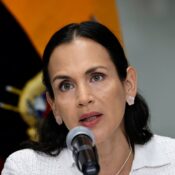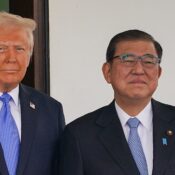
Six UK diplomats are expelled by Russia as tensions over Ukraine missiles increase
The Kremlin expressed its ire at London for what it views as London’s crucial role in assisting Ukraine on Friday when the Russian security agency, the FSB, announced that it had withdrawn the accreditation of six British diplomats in Moscow after accusing them of spying and sabotage activity.
After the UK removed the Russian defense attaché and revoked diplomatic status from many Russian properties in May, Britain called the claims “completely baseless” and claimed they were a tit-for-tat maneuver.
The expulsions were announced by Russia just hours before the U.S. President Joe Biden and British Prime Minister Keir Starmer met in Washington. This was a critical step in securing Kyiv’s approval to launch long-range missiles against Russian targets.
President Vladimir Putin declared on Thursday that if the West let Ukraine to use long-range missiles manufactured in the West to attack Russian territory, then the West and Russia would engage in direct combat. This would, he claimed, change the character and extent of the battle.
Putin, according to the Kremlin, conveyed a message to the West that was unambiguous and plain, and it was certain that the message had been received.
Three Western sources said that Washington and London saw Iran’s announcement this week of delivering ballistic missiles to Russia for use against Ukraine as a serious escalation and that it has accelerated negotiations on Ukraine’s use of long-range missiles. Iran and Russia have refuted any such supplies.
The primary KGB’s replacement in the Soviet Union, the Federal Security Service (FSB), claimed to have evidence that a British foreign office department in London overseeing Eastern Europe and Central Asia was arranging for “the escalation of the political and military situation” and was in charge of guaranteeing Russia’s strategic defeat in its conflict with Ukraine.
“The facts revealed give grounds to consider the activities of British diplomats sent to Moscow by the directorate as threatening the security of the Russian Federation,” the FSB stated in a statement.
“On the basis of documents provided by the Federal Security Service of Russia and as a response to the numerous unfriendly steps taken by London, the Ministry of Foreign Affairs of Russia, in co-operation with the agencies concerned, has terminated the accreditation of six members of the political department of the British Embassy in Moscow in whose actions signs of spying and sabotage were found,” it stated.
Britain claimed that the charges made by Russia against its ambassadors were unfounded.
A British Foreign Office spokesperson said in a statement that “the Russian authorities revoked the diplomatic accreditation of six UK diplomats in Russia last month, following action taken by the UK government in response to Russian state directed activity across Europe and in the UK.”
“We are unapologetic about protecting our national interests.”
LARGE-SCOPE MISSILES
Hours before Starmer lands in Washington to advance talks on getting U.S. President Joe Biden’s approval for Kyiv to use Britain’s Storm Shadow missiles, which have a range of more than 250 km (155 miles), inside Russia, Russia’s decision to expel British diplomats heightens tensions between Moscow and London.
According to sources, the meeting is an additional step in the negotiations to grant Ukraine permission to utilize Western long-range missiles against Russian targets, something that President Volodymyr Zelenskiy of Ukraine has been requesting for months.
A decision might be reached during the United Nations General Assembly, which convenes on September 24th, according to a Western source.
According to the New York Times, which cited European sources, the US appears prepared to sanction Ukraine’s employment of long-range missiles against Russian targets, provided that the weapons were not American-supplied.
ASSISTANCE WITH FOOTAGE
The six British diplomats were identified and their photos displayed on Russian state television. Russian media was also given access to surveillance footage of them, which included secret video footage of a British official having a meeting.
“We decided to expel these six to begin with because the English did not take our hints about the need to stop this practice (of carrying out intelligence activities inside Russia),” the unidentified FSB employee said to the Russian TV channel Rossiya-24.
According to the FSB, should more British diplomats be discovered to be involved in similar activities, Russia would request that they return home early.
According to the FSB, which was quoted in the newspaper Izvestia, the British diplomats had enlisted young Russians, planned what they called provocations, and had meetings with opposition leaders at the British ambassador’s Moscow residence.
It claimed that many of the individuals coordinating Britain’s work on Ukraine from London and Kyiv were employed by the MI6 foreign intelligence service and accused British diplomats of collaborating with Russian activists to try and foment divisions within Russian society around various ethnic groups and migrants. It provided no specifics.
The British embassy’s operations in Moscow, according to Maria Zakharova, a spokesperson for the Russian Foreign Ministry, have beyond the bounds of the diplomatic protocols established in Vienna.
“More importantly, it is not just a question of formality and non-compliance with declared activities, but of subversive actions aimed at damaging our people,” Zakharova stated on Telegram.
All Categories
Recent Posts
Tags
+13162306000
zoneyetu@yahoo.com



